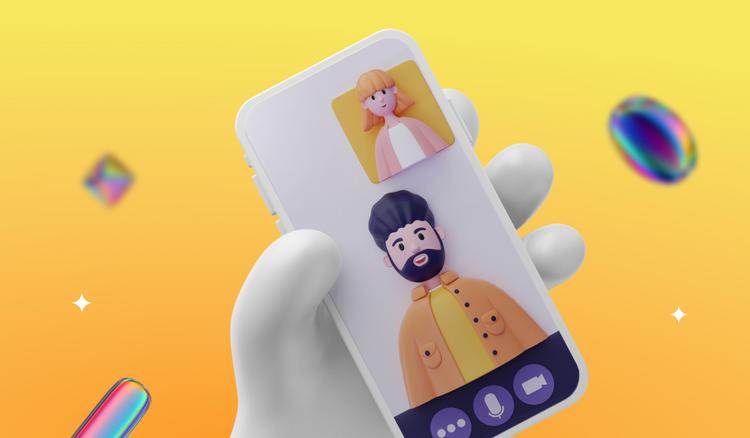Jumping into the development process without understanding the needs and wants of your target audience is like shooting in the dark. If you are uncertain about where to start mobile app development, detailed app market research is a foolproof step to take.
- Why shouldn’t you skip this step?
- What kind of data is needed?
- And, most importantly, how to use gathered information to your advantage?
This post will shed light on the essentials of mobile app research and explain how your business can make informed decisions about product development strategies to deliver maximum value.
What is app market research?
Mobile app research is an integral part of the discovery phase of mobile app development. In fact, it is something that no startup owner should take lightly if they are looking to break into the mobile app industry.
At its core, app market research is a concept that helps businesses identify trends and user preferences, and reduce the risks of creating a product that fails to hit customer needs. With this knowledge in hand, you'll be able to make informed decisions about the right direction to move on.
Why should you start your project with a discovery phase?
Read the articleWhy is app market research so important?
According to Business of Apps, the number of applications available across iOS and Android platforms has reached over 7 million, and it’s not the limit. The massive outspread is expected to continue and lead to an annual growth rate of 7.77% with a projected market volume of US$614.40bn by 2026. We bet you don't want to get lost among them, do you?
Here are the benefits that such research brings:
Stand out among your rivals
Granular mobile app research provides insights into where competitors are succeeding or failing in their efforts, allowing businesses to adjust their strategies accordingly. With the right data and the best analytics tools, companies can craft apps that stand out from the competition while still being attractive for users to download and use them.
Increase your chances for a successful launch
Besides, market research will increase your chances of success when releasing an application. You will know the right targeting, optimal launch time, possible obstacles, and ways to eliminate them. In other words, if you’re serious about stepping into this highly competitive space – do your homework first!
Reduce the risk of wasting resources
By conducting deep research before investing financial resources or time into a project, you can significantly reduce your risk of wasting both. Plus, you ensure that all efforts are focused on creating an app that will be successful in today's competitive market.
Mobile app research milestones
Though mobile app research may vary from one industry to another, there’re some obligatory milestones you should cover to move your mobile app development in the right direction. Here’re the most crucial pieces in mobile app market research
1. Target audience identification
Understanding your target audience should be one of the first steps when conducting mobile app market research. By defining a clear portrait of your target audience, you can ensure that your mobile app is tailored to the needs of those specific individuals. This will help you create an effective marketing strategy and develop features that are most likely to be appreciated by your intended users. Additionally, for B2B-focused apps, referring to a B2B SaaS Marketing Guide can provide targeted insights to refine audience analysis and strategy.
Try to be as specific as possible and consider such parameters as age, gender, demographics, location, specialization, income, personal interests, and preferences, among other traits. Another crucial point is to learn the types of devices they prefer to utilize so that you can tailor the design and features of your app to fit their expectations.
Ultimately, it’s an excellent idea to find out the social media platforms your target audience uses. This insight will help you maximize engagement with potential customers and provide valuable feedback from existing ones.
From our experience this step is one of the most important ones to develop a fully-functioning mobile app or an MVP. You have to precisely define who your users are to craft the most relevant user journeys and develop the features they need: no less, no more.
Let’s say you are creating a food delivery app and your target users are young people who want fast deliveries and more fast food. Then you should focus on including more fast food restaurants as your partners and make the process of ordering as fast and intuitive as possible.
On the other hand, if you see that most of your customers are middle-aged individuals who have cars and are focusing on a healthy lifestyle, you may need to look for more healthy food restaurants to be featured and show the takeaway option along with the delivery.
Those are just hypothetical examples, but depending on the target audience its realization differs. That is why, you should perform a very deep audience investigation in order to succeed.
“Analysis of the target audience is not just an important stage in the application research, it is the key to success and the full implementation of the idea.
Sometimes it seems to us that we perfectly understand the needs of the audience, trying to imagine ourselves in their place. However, this idea is nothing more than an illusory sketch, an imagination far from reality. To avoid this, one of the best strategies is to get survey responses directly from your target audience, ensuring that your app's features align with their actual preferences.
In order to be in demand with the audience, you need to clearly understand and know it in detail, based on real analysis data.”
— Waleriya Bagnyuk-Yurkantovich, Business Analyst at SolveIt
2. Competitor analysis
The mobile app market is a rapidly changing landscape, and if you want to stay ahead of the competition, keep sight of your rivals. Conducting mobile app market research is the best way to ensure that you have a competitive edge over other similar products and can provide users with an experience that surpasses what they might already be familiar with. You can also leverage tools like web scraping API to gather data and insights from the competitive landscape in real-time. In some cases, using a proxy service can also help you collect market data securely and anonymously, ensuring you don’t face IP blocks or restrictions. For large-scale data collection, using the best mobile proxies can provide stable, real-user IPs that minimize detection risk — making it easier to gather accurate market insights and competitor intelligence across multiple regions.
To get even deeper insights, you can conduct qualitative market research, which focuses on understanding user behaviors, preferences, and attitudes through non-numerical data. This approach can uncover valuable qualitative insights that may not be immediately apparent through quantitative data alone.
Top 15 best app store optimization tools for mobile apps
Read articleBy understanding your competitors' tactics, you can identify areas for improvement. One way to enhance your analysis is by using data discovery tools, which help you analyze large datasets, uncover valuable trends, and gain insights into what your competitors are doing, allowing you to spot opportunities and refine your own strategies. As a way to give your app a solid competitive advantage, try to figure out user needs that haven't been met yet and address them more efficiently. However, if you face complications when trying to gather data consider using Cloudflare bypass to avoid any restrictions and ensure you collect comprehensive and accurate data.
Finally, conducting competitor analysis will help you develop better marketing strategies as well as get to know how much time and resources should be allocated toward development efforts. This will ensure that all aspects of launching a successful application are taken into account.
The role of data extraction in mobile app development
Read articleReal-world example
For example, market analysis for one of our clients’ projects revealed the key USP to implement. The client was looking to develop a new scalable app for job search and redesign its interface. It was critical to find something that would help the client to get ahead of the other market players.
Thanks to the competitor analysis it was decided to show salary for every vacancy in the application for one simple reason: no other job search app in the region had it. As a result, the app became the best business application in the App Store already after the first week after the release. Isn’t it a remarkable result?
3. SWOT analysis
SWOT analysis is a field-proven concept for mobile app research that reveals the strengths, weaknesses, opportunities, and threats of your idea or product before investing in development. To take into account all factors from both inside and outside of your organization, you need to assemble a team of experts from all areas and levels. That way, you can get the most comprehensive picture possible.
- Strengths: What are your core competencies? What do you do better than anyone else?
- Weaknesses: Are there any areas where performance could be improved?
- Opportunities: Which markets could be exploited with your app? What are the ways of entering into new markets?
- Threats: How vulnerable are you to external factors such as competitors entering the market with superior offerings, changes in customer preferences, and so on?
Once everyone has contributed their insights, you will uncover some blind points as well as have an accurate representation of the current situation and potential future prospects with the help of SWOT analysis examples. And who knows – it might just open up some exciting possibilities!
4. Mobile app idea validation
Take validation of a mobile app idea like a test drive before you buy a new car. It helps you determine if the audience will be interested in what you have to offer. By testing out different ideas, you can identify potential problems before they become costly mistakes and refine your concept into something customers actually want to use.
How to validate your app idea? Make sure to get first-hand feedback from your target audience. Use surveys, interviews, or any other available options to learn what they really think of your app.
However, you should be prepared for a negative outcome either. We understand that realizing that there is no market need for your mobile app is a bitter pill to swallow. But even if your findings reveal the lack of user interest, always look at the bright side of things – you save both time and money by not investing in something that wouldn't be profitable anyway.
Need professional assistance? Get a free consultation!
Contact usMarket research methods
Considering the milestones mentioned above, it's time to dive into the nitty-gritty details of how to collect data in order to make your predictions accurate and comprehensive. We’ve collected four methods that you may use as part of your journey toward success:
Statistical research
Since figures always speak for themselves, real-time statistics can become a great source of insights for your mobile app market research. Valuable information on the current industry trends helps to determine what strategies are most effective for launching an application that users will adore. With statistical data, you can identify which platforms, demographics, or countries would be most beneficial to target with your app. To gather this data efficiently at scale, you can leverage datacenter proxies for quicker data collection practices.
- Statista is an invaluable resource for anyone looking to get their hands on the latest figures and understand market trends across 170 industries in more than 150 countries.
- Sensor Tower is a powerful tool that provides insights into the mobile app economy, including app store optimization (ASO) data and key metrics to track app performance scraping data from the web in real time.
- data.ai, formerly App Annie, is a platform that opens access to detailed mobile app analytics about downloads, revenue, usage trends, and more.
- McKinsey & Company is the trusted advisor that brings act-based insights and signature reports on main industries, including mobile app development.
- Business of Apps is a valuable resource that provides insightful podcasts and articles that include stats about the leaders of the global app industry.
Surveys
Surveys are a great way to learn how users feel about your product and how you can improve it as long as you ask the right questions. With platforms like SurveyMonkey or Typeform, crafting a questionnaire is as easy as pie, but don’t forget that surveys come with a few caveats.
You need to be careful in crafting the right questions and make sure they’re not too narrow or too open-ended. One-world answers won't give you much useful information either while long surveys pose the risk that people lose interest mid-way through.
When it comes to collecting feedback for your mobile app research, make sure you survey unbiased people who have no connection with you or those close to you. Otherwise, their opinions will likely be biased one way or another. Also, remember that negative feedback can sometimes provide more illuminating discoveries than positive comments, so use this knowledge wisely when interpreting survey results.
Customer interviews
Conducting user interviews is a valuable mobile app research technique that should be used throughout your app development journey. Interviews with potential customers open up the reasons why users make their decision whether they want your app to be installed on their device or not. Additionally, they help you identify potential issues that could arise during the development process and validate ideas before committing them to code.
User interviews can be conducted over call or video, giving you access to users from all around the world as well as those living close by. As an alternative to a personal interview, you can also assemble a focus group. This allows you to get feedback from different perspectives which can help to shape the product accordingly.
Social media listening
If you’ve never leveraged social media listening as part of your marketing strategy, it’s high time to begin. Put shortly, this tactic is aimed at monitoring social media to spot mentions of your product or company. But how to apply the power of social media listening for mobile app market research?
Given that almost half the world's population uses social media on a regular basis, it becomes a goldmine of useful knowledge. First, identify the key topics related to your business or industry that people are talking about on social media platforms. Then set up a monitoring system so you can track conversations around those topics in real time. Once you’ve gathered the data, you can further analyze it using social media analytics tools to measure engagement, trends, and overall performance of your social media presence. In some cases, you may even consider turning off Facebook comments on specific posts you publish, especially if you want to avoid spam or off-topic replies that could distort the accuracy of your market research insights. These insights can help refine your mobile app marketing strategies to better align with customer sentiment and industry trends.
How to apply the findings to your mobile app?
The app market research is not the endpoint in the discovery phase of app development. Further, you need to compare all your findings to the assumptions that you had at the beginning of this journey and reshape your strategy in line with new data. Besides, the preparatory steps also include developing a design concept, conducting technical analysis, and formulating the value proposition.
If you are new to this matter, SolveIt experts will be happy to assist with discovery phase services as our team has obtained vast experience in tailoring mobile app ideas to your business needs.
When all the gaps are filled and the overall vision is formed, you can get down to mobile app development. We recommend securing yourself and starting with MVP development first, instead of building a full-fledged mobile app right away.
Turn your idea into a successful MVP
Read the articleInvesting only in basic features will allow you to test the waters before committing more time and financial resources to further development. With the focus on core features, developers can create an MVP faster than they could develop and launch an all-inclusive mobile application. Plus, it’s a witty opportunity to get user feedback quickly so that any necessary changes or improvements can be made sooner in the process.
Summing up
Skipping market research for mobile app development is like gambling with your company's resources – you may win big or lose even bigger! Without understanding the market and its needs, companies risk wasting significant resources on an idea that is not viable in the long run.
So if you're thinking about developing an app for your business, take your time to do thorough mobile app research, or leave this task to a reliable mobile app service provider.

![How to create a fitness app: complete development guide [steps, features, costs]](/_next/image?url=https%3A%2F%2Fsolveit.dev%2Frails%2Factive_storage%2Fblobs%2FeyJfcmFpbHMiOnsibWVzc2FnZSI6IkJBaHBBaVlDIiwiZXhwIjpudWxsLCJwdXIiOiJibG9iX2lkIn19--f4f49625f7b386f020ef279402f1313a6711742a%2FHow%2520to%2520build%2520a%2520fitness%2520app1-min.jpg&w=750&q=75)

